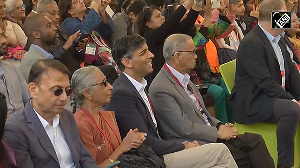It was not surprising to see the support a fellow columnist received from other presumably single-by-choice women for her rousing piece on the pressures a woman must face for choosing to remain single.
For the most part, it is hard not to agree with Anjana Nair. But what's in the deal for a man who chooses not to get married?
Read: Anjana Nair: I am not against marriage, but...
The times are a-changing, and no one is more at the receiving end than the male Homo sapiens. Marriage, his traditional dominion of control, is fast changing lanes and skidding into a sticky mud track.
Today men find themselves in a confusing vortex of change. They can no longer exert the superiority that once came naturally to them. They can no longer play to fullness the social roles once cut out for them -- they are no longer sole breadwinners or the only ones who drive the car. While the diaper-changing dad was once a cute exception to the parental
norm, such duties are now a mandatory prerequisite.
Having grown up with role-appropriate stereotypes, many men now find themselves unprepared for a world that has changed in a blink, where they cannot be at ease with themselves anymore.
They now have to stand up to answer new questions -- of existence, of purpose, of their social role in a world where the balance is tilted, more than a little unfairly, in favour of the new, improved global woman.
In the gender street fight, there are new rules of engagement.
For their part women have created moulds for their preferred man, upholding an idea of what male role models should be like. Tall, dark and handsome is passé. Over the years an image has been cultivated of the desirable male. If he hopes to stand a chance, a man must squeeze himself into the new mould. If he lavishes any dreams of getting hitched a man must know what a woman wants.
There still walk men who dream of marrying 'chaste' women -- these folks are in for some pretty rough surprises. With one part shock and three parts reluctance, more and more parents are accepting the notion of their daughters' sexual liberty. But when it comes to preparing the script for an arranged marriage, they continue to mask the facts.
Virginity is a tender topic. A man may have had girlfriends, but the woman's previous relationships are airbrushed away with pretty conversation. The tainting past is stifled, often forcefully forgotten. The threat of silence hangs like a Damocles sword over the marriage until someone musters the guts to spill the truth.
My friend recently went through a premarital relationship that was terminated through parental intervention. For a while she refused to get married but she eventually backed down to family pressure. Before she was married, she thought about telling her husband about her past but kept mum at her parents' insistence. When I asked her father if the truth might pose a risk to her marriage if it surfaced later, he shrugged and reasoned: "Once they have kids, who is going to think about all that?"
No wonder women see the attempt to get them 'married off' as a threat to their independence. For parents, it is the fulfilment of duty. In all fairness they see marriage as a step that enables their children to 'settle down'.
The interpretation of 'settle down' is open to question: parents see it as means to help their children start a family. But do they really need that help? In sheltered, conservative families where men and women are not adequately socialised they may believe they do not have the skills to seek out a mate by falling in love. In any case, falling in love is deemed a taboo. Marriage is supposed to be a business conducted by your parents and other family -- you and your partner are merely actors in that play.
In a cosmopolitan setting men and women are equally career-driven. One of my friends always tells her female friends who want to get married: "Make sure you have a job, you will always have something to fall back on." I used to regard her feminist zeal with quaint amusement. But I think I see where she is coming from.
Choice is everything for the new woman. Independence grants her the right to choose -- if need be she chooses to bear her children alone and raise them alone. She may even excise a man from her life to preserve her independence. If men are loath to change to fit the new mould, women can do without them.
Now the question is: Are men afraid of such women?
It was my old friend in crisis, Oscar Wilde, who said: 'Women as a sex are sphinxes without secrets.'
I attribute his quote to foreknowledge rather than impetuosity.
In late 19th century English society where men fell over each other writing pathetic ditties for some bemoaned fair beloved, Wilde was a playwright who got quickly to the point. Because he understood the female mind better and with almost no chauvinism compared to writers of his time, he showed more depth than his contemporaries in detailing his female characters and their complex psychological machinery. As a result I believe Wilde's female characters were among the first, crafted by a male, to have nearly as much dimension as his male characters.
Wilde was a man of the world who had travelled to Europe and America and helped revive The Woman's World magazine, which he edited from 1887 to 1889. His marriage to Constance Lloyd collapsed when he became involved with Lord Alfred Douglas in 1891. Wilde was tried for homosexuality and sentenced for four years with hard labour for the crime of sodomy, then illegal in England.
Gay or not, Wilde would easily have been what we today call the metrosexual male: one who is in touch with himself and his finer -- read, feminine -- side. He was a male who understood females the way they wanted to be understood -- a la Mel Gibson in What Women Want.
There must have been several men in Wilde's England who wanted to make a choice, but never had the courage. Equally, there may be several women in India who did not want marriage, but had no choice.
The more we begin to see marriage as a choice more than a social necessity, the better for us. If we blindly rush through the heat of puberty and the doldrums of adolescence into an indecisive adulthood so that our bodies can be unhappily married to produce bitter offspring, we are getting the whole idea of marriage wrong.
On another count, does it mean if you are not a metrosexual male, you ought to be geared for trouble? Maybe Anjana Nair can answer that.






 © 2025
© 2025